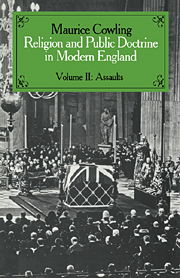Book contents
- Frontmatter
- Foreword
- Contents
- Projected contents of Volume III (for publication c. 1988–90)
- INTRODUCTION
- I THE ASSAULT ON THE EIGHTEENTH CENTURY
- 1 Tractarianism as Assault
- 2 Ruskin and Protestantism
- 3 Gladstone, Oxford and Christianity
- 4 Tractarianism as Constructive Assault
- II THE ASSAULT ON CHRISTIANITY
- III THE ASSAULT ON CHRISTIANITY IN THE TWENTIETH CENTURY
- IV ASSAULTS ON THE ASSAILANTS
- CONCLUSION: ASSAULTS AND ACCOMMODATIONS
- Notes
- Index of main names
2 - Ruskin and Protestantism
Published online by Cambridge University Press: 23 December 2009
- Frontmatter
- Foreword
- Contents
- Projected contents of Volume III (for publication c. 1988–90)
- INTRODUCTION
- I THE ASSAULT ON THE EIGHTEENTH CENTURY
- 1 Tractarianism as Assault
- 2 Ruskin and Protestantism
- 3 Gladstone, Oxford and Christianity
- 4 Tractarianism as Constructive Assault
- II THE ASSAULT ON CHRISTIANITY
- III THE ASSAULT ON CHRISTIANITY IN THE TWENTIETH CENTURY
- IV ASSAULTS ON THE ASSAILANTS
- CONCLUSION: ASSAULTS AND ACCOMMODATIONS
- Notes
- Index of main names
Summary
‘The civilised world is at this moment collectively just as Pagan as it was in the second century; a small body of believers being now as they were then representative of the Church of Christ in the midst of the faithless but there is just this difference, and this very fatal one, between the second and nineteenth centuries, that the Pagans are nominally and fashionably Christians.’
John Ruskin The Stones of Venice 1853 vol. iii p. 109.‘I did not in my Good Friday's letter explain enough what I meant by saying I had come to the place where the “two ways met”. I did not mean the division between religion and no religion; but between Christianity and philosophy: I should never, I trust, have become utterly reckless or immoral, but I might very possibly have become what most of the scientific men of the present day are: they all of them who are sensible believe in God, in a God, that is: and have I believe most of them very honourable notions of their duty to God and to man: but not finding the Bible arranged in a scientific manner, or capable of being tried by scientific tests, they give that up and are fortified in their infidelity by the weaknesses and hypocrisies of so-called religious men (who either hold to what they have been taught because they have never thought about it or pretend to believe it when they do not). The higher class of thinkers, therefore, for the most part, have given up the peculiarly Christian doctrines, and indeed nearly all thought of a future life. […]
- Type
- Chapter
- Information
- Religion and Public Doctrine in Modern England , pp. 27 - 51Publisher: Cambridge University PressPrint publication year: 1985



